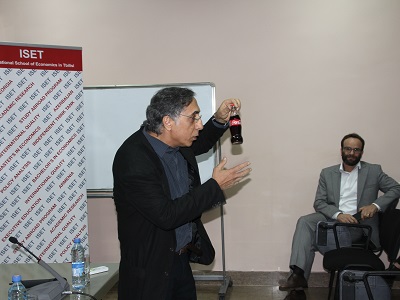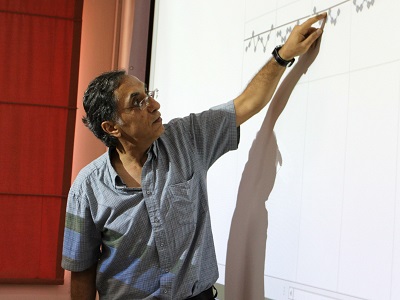On November 9, Daniel Levy, a professor of economics at Bar Ilan University, Emory University and a member of ISET’s International Faculty Committee, presented his paper ‘‘The real thing’: nominal price rigidity of the nickel Coke, 1886-1959“ (co-authored by his colleague Andrew Young) to ISET professors, students and researchers.
Prof. Levy’s interesting topic and entertaining presentation kept the audience of the conference hall totally engaged throughout the seminar.
We have all noticed that prices usually change; that's fundamental to how economies work. And yet in 1886, a bottle of Coke cost a nickel. It was also a nickel in 1900, 1915 and 1930. In fact, 70 years after the first Coke was sold, you could still buy a bottle for a nickel. Three wars, the Great Depression, hundreds of competitors — none of it made any difference for the price of Coke. Why not?
On October 10, 2017, Professor Hans Wiesmeth challenged ISET BA students to think about possible solutions to environmental issues, more specifically, how the country can deal with beverage packaging, which is a global environmental issue, with 1 billion plastic bottles produced each day (more than ten thousand every second). Only about 10% of these bottles are currently recovered and recycled.
Professor Wiesmeth presented his joint work in cooperation with N. Shavgulidze and N. Tevzadze (CENN), and Levan Pavlenishvili (ISET), which was entitled “Drinks Packaging in Georgia: Design of an Integrated Environmental Policy.” Professor Wiesmeth reviewed the current situation in Georgia, where there isn’t any separate collection or recycling of drinks containers, where the most waste packaging is taken to landfills, creating health concerns regarding plastics (some 30,000 tons), and refillable drinks containers are (almost) non-existent.
“You need to think carefully before you jump into this deep sea,” said Professor Daniel Levy at the very beginning of a presentation entitled “Why can a PhD be bad for you?”. While this statement sounded frightening to those who were planning to pursue a PhD or other further studies, it appeared to be more bemusing for others who were not considering a career in academia.
Based on his personal experience, Dr. Levy explained that substantial difficulties come with academic life: a PhD is not a continuation of an MA, and it constitutes an “unbelievable amount of commitment”. It requires “focus, and lots of patience, time and energy”. Dr Levy recalled that during his studies, he took most of his meals sitting in front of a computer or with his nose buried in a book.













